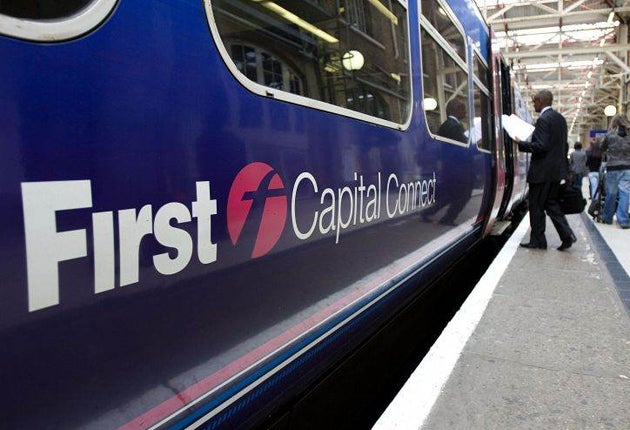Rail investment worth £8bn is not enough, train companies warn
Passengers still face misery of overcrowding as Governmentis criticised for cuts and underestimating demand on network

An £8billion plan to relieve the overcrowding crisis on Britain's rail network was unveiled by the Government yesterday, but train companies immediately warned it may not be enough to meet ballooning demand.
Passenger groups said yesterday it was "delivery time" for the Government and rail companies, as commuters would not tolerate having to stand on packed trains and forced to pay higher fares over the next few years.
More than 2,000 new carriages have been promised, though many users will have to wait almost a decade to see the benefits of the investment. Capacity on the network will increase by 2019, with an extra 185,000 passenger places.
In the short term, the Labour government's plan to deliver 1,300 new carriages by 2014 was slashed in half. It has not been decided where the extra 650 vehicles will be used. Plans to modernise a stretch of track between London and Swansea were also shelved.
The big winners will be commuters in the South East. As many as 1,200 new carriages have been promised for the Thameslink line, which takes commuters from Bedford to Brighton into central London. However, its expansion will be completed two years later than planned, despite annual fare rises of well above inflation.
Another 600 carriages have been earmarked for the Crossrail project, connecting Maidenhead to Shenfield in Essex. Commuter routes between London and Oxford, Newbury and Didcot will be electrified, allowing faster journeys and cheaper running costs.
Routes in the North West, connecting Liverpool, Manchester, Blackpool and Preston, will also be electrified.
Having to wait for the improvements will annoy many commuters. Rail passengers will be hit with an average fare rise of 6.2 per cent in January. Some will see much higher increases in their ticket costs, with some routes seeing rises of as much as 12.8 per cent.
Doubts immediately arose over whether the scheme would be enough to rescue commuters from packed trains, even when completed. Demand for seats is still increasing, despite the struggling economy. Recent figures from the Office of Rail Regulation revealed a 9 per cent rise in passenger numbers in the third quarter of 2010 compared to last year.
"Today's announcement still leaves several questions unanswered," said Michael Roberts, chief executive of the Association of Train Operating Companies. "New trains for London's Thameslink scheme will come as a relief to passengers and operators where new carriages are desperately needed to deal with overcrowding. However, real question marks remain over whether key commuter routes in other parts of the country will be receiving enough new carriages quickly enough."
Rail industry officials also slammed the complicated system for buying new coaches yesterday, arguing that the way in which the Government decided how many new trains were needed was pushing up the costs of rail travel and preventing further investment.
Several promises to solve the problem of a chronic lack of seats on commuter services have already been broken over recent times. In a highly critical report published earlier this month, MPs painted a gloomy picture about the creaking rail system, concluding that overcrowding would become even worse over the next four years.
They warned that by 2014, there would be a 15 per cent shortfall in extra places delivered in London for peak-time commuters than had been promised by the Labour Government. The shortfall would be even worse elsewhere, they said.
Passenger groups criticised the delays in delivering benefits for commuters. "We are very pleased that Thameslink is going ahead in its entirety," said Jo deBank, of rail passenger watchdog London TravelWatch. "However, we are disappointed that passengers will have to endure severe disruption for a further three years, especially at a time when passengers are suffering huge fare rises."
Anthony Smith, chief executive of Passenger Focus, said promises needed to be kept. "Now it is all about delivery," he said. "Commuters will not be happy paying higher fares if they are forced to use overcrowded services. It is delivery time."
Subscribe to Independent Premium to bookmark this article
Want to bookmark your favourite articles and stories to read or reference later? Start your Independent Premium subscription today.

Join our commenting forum
Join thought-provoking conversations, follow other Independent readers and see their replies